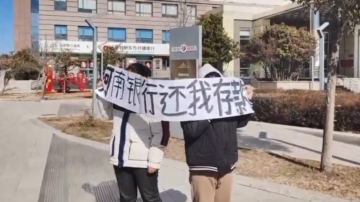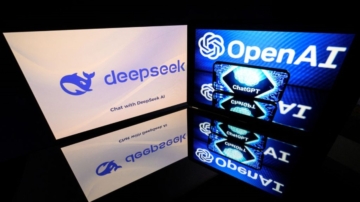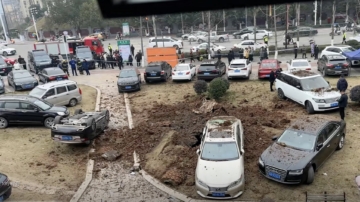【新唐人2013年06月19日訊】中共黨刊《求是》雜誌刊發評論文章,批評中國大陸互聯網上充滿所謂「負能量」,聲稱,網民網上的謾罵,「罵不倒黨和政府」,作者還說,與其謾罵不如「斷網」。但文章引髮網民的跟貼炮轟,中共跟著急速刪貼。評論說,這篇文章對網民是一種誣衊,是中共想進一步控制人民的思想、言論,成為它馴服的工具。
6月17號,《求是》刊出「警惕網絡負能量」的評論文章,內容說,互聯網充斥著所謂的負面信息,凡是政府闢謠的就一定是事實,凡是官方發佈的就一定有黑幕,凡是社會矛盾就一定是體制問題。
文章認為造成這種所謂「網絡負能量」的成因:一是,網絡媒體的炒作添油加柴﹔二是,特定人群的情緒宣洩﹔三是,某些「意見領袖」的蓄意鼓動﹔四是,「網絡水軍」的推波助瀾。
文章批評網民的「人肉搜索」等行為,讓越來越多的人談網色變。宣稱:網民應該明白:罵,罵不倒黨和政府,與其沉溺於網絡發洩不滿、抱怨社會,不如斷開網線,勤奮工作。作者還警告說,網上活躍份子在享有自由發言權的同時,必須為自己的言論承擔責任。
這篇文章引出幾萬跟貼,同時炮聲隆隆。不過,18號上午,各大媒體開始刪貼。
時政評論員汪北稷指出,這篇文章發出的信號,是中共想進一步控制人民的思想,控制人民言論的自由、打壓人民追求思想自由的空間,成為它馴服的工具。
時政評論員汪北稷:「它的標題就是恐嚇性的,罵不倒它的黨和政府,但是,請問:王義軍叛逃到美國的領事館、薄熙來犯罪的事實,這些難道是網民造成的嗎?跟網絡、人民的探討空間有甚麼關係呢?所以共產黨本身的罪惡,它本身官員的貪腐,本身的獨裁、鎮壓是它本身的邪惡機製造成的,網絡正好是揭開共產黨遮羞布的一個工具。」
汪北稷指出,近年來,網路揭露出來的貪官,從南京的「天價煙」局長,到陝西的「表(錶)哥」、「表(錶)叔」,再到廣州的「房叔」、「房嬸」,再到「雷政富不雅視頻」引發重慶21名淫官落馬。及最近,發改委副主任劉鐵男涉貪、包養情婦被免職﹔以及中共中央辦公廳官員範某性醜聞等,已經讓中共貪官談網色變。
而北京時政觀察人士華頗認為,這篇文章代表了中共對網路的仇視﹔對民意,表現出一種死豬不怕開水燙,笑罵由他的態度﹔同時也表現出中共對網絡失守的無奈。
北京時政觀察人士華頗:「因為它看到網絡世界上,官方的所謂『正能量』,屢屢敗於網絡上的『負能量』,(所以)官方要加強網絡管制,對於網絡的輿論不是引導,而是對負面輿論要堅決的制止。」
汪北稷指出,這篇文章的出臺,和之前的「反憲政」等極「左」文章,一脈相承。
汪北稷:「那些文章從一定的高度來否定普世價值、否定打倒共產黨的重要性,這篇文章從網路的角度來附和它,這是中共最近在思想領域向左轉的一種標誌,這個是反人民的、反人類的一種思想的表達,這個對大陸的網民是非常不公平的一種誣衊,對網絡的正面作用是一種否定。」
汪北稷認為,這是告訴千千萬萬個網民,中共非常恐懼網民對它的揭露、否定和批判,所以才要求網民斷網,不要去看真相、追求真相、不要去退黨、不要去翻牆,一切都聽它的黨話,做順民、做奴隸。但是,汪北稷說,這篇文章同時也是鼓舞人們,網絡民意,最終是推倒中共的浪潮。
採訪編輯/李韻 後製/李勇
China's Communist Magazine Deletes Netizens' Criticism
The Chinese Communist Party's (CCP) Qiushi magazine
criticized the Internet as being full of “negative energy.”
The Qiushi article claimed that netizens' curses
won't make the CCP and its regime collapse.
The editor of the article suggested that rather than
verbal abuse, netizens should cease using the Internet.
Many netizens bombarded the article with comments
which were rapidly deleted by the CCP.
Analysts said that this article is slander of netizens,
and that the CCP intends to further control people's thinking
and speech so as to have them become tools of the regime.
On June 17, Qiushi issued an editorial article entitled,
“Vigilance towards the Internet's negative energy –
A rational view of cyberspace.”
The article claimed that the “negative information” propels
the ideas that any rumor denied by the government is certainly
factual and that there must be sinister motives behind
anything the authorities declare,
as well as that any social contradictions must be
the system's problem.
The article listed the cause of the negative energy as coming
from hype by the Internet media, special interests groups,
dissident leaders and fourthly, promotion by the Internet
Water Army (netizens who are paid to post online comments).
The article criticized netizens actions on “Human flesh search
engine” (which refers to massive research on blogs and forums).
It claimed that this negativity is causing increasingly
more people to fear the Internet.
The article said that netizens should be clear about the fact
that the CCP and regime won't be downed by cursing.
Rather than throw anger and complaints, netizens
should stop using the Internet and work hard, it said.
The editor warns that Internet activists who enjoy freedom
of speech should be responsible for their expression.
Several tens of thousands of comments followed the article.
However, on the morning of June 18, media began
to delete the comments.
Wang Beiji, a current affairs commentator, said that
the article was meant to send a message.
It shows the CCP intended to take further control over
people's minds and freedom of expression.
The CCP tries to tame people's minds
and suppress their freedom.
Wang Beiji: “The article's title is in a threatening style.
It mentioned that curses can't make the CCP regime collapse.
I want to ask, 'Wang Lijun's fleeing to the US consulate
and Bo Xilai's crimes, were these incidents created by netizens?
What are the connection between these incidents
and netizens' discussion?
Thus the CCP's crimes, its officials' corruption,
its dictatorship and suppression were caused by its evil system.
The Internet is a tool to unveil the CCP's evil nature.”
Wang said that in recent years, the network exposed
corruption such as Nanjing's Director-general of "sky-high price cigarette",
Shaanxi's “Watch-Wearing Brother,” “Watch-Wearing Brother,”
“Watch-Wearing Uncle,” “House Uncle,” and “House Aunty.”
Lei Zhengfu's sex tape caused the downfall
of 21 Chongqing officials.
Recently, Liu Tienan, a vice minister of the National
Development and Reform Commission was sacked for
accepting bribes and keeping mistresses, and Fan Yue,
a former director of the CCP General Office, was also involved in a sex scandal.
All these revelations caused the corrupt CCP officials
to be fearful of social networks.
Hua Po, Beijing current affairs observer, believes that
this article shows the CCP's hatred of the Internet.
The CCP responded to public opinion using the saying,
“to a dead pig, boiling water is nothing”;
while it also shows the CCP's failure to control the Internet.
Hua Po: “The CCP noticed its official 'positive energy'
on the Internet was often defeated by netizens' 'negative energy'.
Thus the CCP intensifies Internet control.
It didn't guide public opinion, but stopped
netizens' criticism.”
Wang Beiji said that the article has a similar tune of previous
“leftist” articles of the anti constitutional system.
Wang Beiji: “These articles from a certain high level deny
universal values and the importance of overthrowing the CCP.
This article echoes, from the Internet view, that the CCP
is currently turning to the “left”, which is against its people and human beings.
This behavior is unfair slander of netizens,
It is a denial of the positive effects of the network.”
Wang believes that it also tells millions of netizens
that the CCP is very fearful of its evil behavior being exposed, denied, and criticized by netizens.
Thus the CCP requests that netizens stop using the Internet,
don't look at the truth nor pursue the truth,
don't quit the CCP nor unblock its firewall, but only
listen to the CCP and be obedient citizens.
Wang said that this article in some way also inspires people
and the public opinion to tear down the CCP in the end.
6月17號,《求是》刊出「警惕網絡負能量」的評論文章,內容說,互聯網充斥著所謂的負面信息,凡是政府闢謠的就一定是事實,凡是官方發佈的就一定有黑幕,凡是社會矛盾就一定是體制問題。
文章認為造成這種所謂「網絡負能量」的成因:一是,網絡媒體的炒作添油加柴﹔二是,特定人群的情緒宣洩﹔三是,某些「意見領袖」的蓄意鼓動﹔四是,「網絡水軍」的推波助瀾。
文章批評網民的「人肉搜索」等行為,讓越來越多的人談網色變。宣稱:網民應該明白:罵,罵不倒黨和政府,與其沉溺於網絡發洩不滿、抱怨社會,不如斷開網線,勤奮工作。作者還警告說,網上活躍份子在享有自由發言權的同時,必須為自己的言論承擔責任。
這篇文章引出幾萬跟貼,同時炮聲隆隆。不過,18號上午,各大媒體開始刪貼。
時政評論員汪北稷指出,這篇文章發出的信號,是中共想進一步控制人民的思想,控制人民言論的自由、打壓人民追求思想自由的空間,成為它馴服的工具。
時政評論員汪北稷:「它的標題就是恐嚇性的,罵不倒它的黨和政府,但是,請問:王義軍叛逃到美國的領事館、薄熙來犯罪的事實,這些難道是網民造成的嗎?跟網絡、人民的探討空間有甚麼關係呢?所以共產黨本身的罪惡,它本身官員的貪腐,本身的獨裁、鎮壓是它本身的邪惡機製造成的,網絡正好是揭開共產黨遮羞布的一個工具。」
汪北稷指出,近年來,網路揭露出來的貪官,從南京的「天價煙」局長,到陝西的「表(錶)哥」、「表(錶)叔」,再到廣州的「房叔」、「房嬸」,再到「雷政富不雅視頻」引發重慶21名淫官落馬。及最近,發改委副主任劉鐵男涉貪、包養情婦被免職﹔以及中共中央辦公廳官員範某性醜聞等,已經讓中共貪官談網色變。
而北京時政觀察人士華頗認為,這篇文章代表了中共對網路的仇視﹔對民意,表現出一種死豬不怕開水燙,笑罵由他的態度﹔同時也表現出中共對網絡失守的無奈。
北京時政觀察人士華頗:「因為它看到網絡世界上,官方的所謂『正能量』,屢屢敗於網絡上的『負能量』,(所以)官方要加強網絡管制,對於網絡的輿論不是引導,而是對負面輿論要堅決的制止。」
汪北稷指出,這篇文章的出臺,和之前的「反憲政」等極「左」文章,一脈相承。
汪北稷:「那些文章從一定的高度來否定普世價值、否定打倒共產黨的重要性,這篇文章從網路的角度來附和它,這是中共最近在思想領域向左轉的一種標誌,這個是反人民的、反人類的一種思想的表達,這個對大陸的網民是非常不公平的一種誣衊,對網絡的正面作用是一種否定。」
汪北稷認為,這是告訴千千萬萬個網民,中共非常恐懼網民對它的揭露、否定和批判,所以才要求網民斷網,不要去看真相、追求真相、不要去退黨、不要去翻牆,一切都聽它的黨話,做順民、做奴隸。但是,汪北稷說,這篇文章同時也是鼓舞人們,網絡民意,最終是推倒中共的浪潮。
採訪編輯/李韻 後製/李勇
China's Communist Magazine Deletes Netizens' Criticism
The Chinese Communist Party's (CCP) Qiushi magazine
criticized the Internet as being full of “negative energy.”
The Qiushi article claimed that netizens' curses
won't make the CCP and its regime collapse.
The editor of the article suggested that rather than
verbal abuse, netizens should cease using the Internet.
Many netizens bombarded the article with comments
which were rapidly deleted by the CCP.
Analysts said that this article is slander of netizens,
and that the CCP intends to further control people's thinking
and speech so as to have them become tools of the regime.
On June 17, Qiushi issued an editorial article entitled,
“Vigilance towards the Internet's negative energy –
A rational view of cyberspace.”
The article claimed that the “negative information” propels
the ideas that any rumor denied by the government is certainly
factual and that there must be sinister motives behind
anything the authorities declare,
as well as that any social contradictions must be
the system's problem.
The article listed the cause of the negative energy as coming
from hype by the Internet media, special interests groups,
dissident leaders and fourthly, promotion by the Internet
Water Army (netizens who are paid to post online comments).
The article criticized netizens actions on “Human flesh search
engine” (which refers to massive research on blogs and forums).
It claimed that this negativity is causing increasingly
more people to fear the Internet.
The article said that netizens should be clear about the fact
that the CCP and regime won't be downed by cursing.
Rather than throw anger and complaints, netizens
should stop using the Internet and work hard, it said.
The editor warns that Internet activists who enjoy freedom
of speech should be responsible for their expression.
Several tens of thousands of comments followed the article.
However, on the morning of June 18, media began
to delete the comments.
Wang Beiji, a current affairs commentator, said that
the article was meant to send a message.
It shows the CCP intended to take further control over
people's minds and freedom of expression.
The CCP tries to tame people's minds
and suppress their freedom.
Wang Beiji: “The article's title is in a threatening style.
It mentioned that curses can't make the CCP regime collapse.
I want to ask, 'Wang Lijun's fleeing to the US consulate
and Bo Xilai's crimes, were these incidents created by netizens?
What are the connection between these incidents
and netizens' discussion?
Thus the CCP's crimes, its officials' corruption,
its dictatorship and suppression were caused by its evil system.
The Internet is a tool to unveil the CCP's evil nature.”
Wang said that in recent years, the network exposed
corruption such as Nanjing's Director-general of "sky-high price cigarette",
Shaanxi's “Watch-Wearing Brother,” “Watch-Wearing Brother,”
“Watch-Wearing Uncle,” “House Uncle,” and “House Aunty.”
Lei Zhengfu's sex tape caused the downfall
of 21 Chongqing officials.
Recently, Liu Tienan, a vice minister of the National
Development and Reform Commission was sacked for
accepting bribes and keeping mistresses, and Fan Yue,
a former director of the CCP General Office, was also involved in a sex scandal.
All these revelations caused the corrupt CCP officials
to be fearful of social networks.
Hua Po, Beijing current affairs observer, believes that
this article shows the CCP's hatred of the Internet.
The CCP responded to public opinion using the saying,
“to a dead pig, boiling water is nothing”;
while it also shows the CCP's failure to control the Internet.
Hua Po: “The CCP noticed its official 'positive energy'
on the Internet was often defeated by netizens' 'negative energy'.
Thus the CCP intensifies Internet control.
It didn't guide public opinion, but stopped
netizens' criticism.”
Wang Beiji said that the article has a similar tune of previous
“leftist” articles of the anti constitutional system.
Wang Beiji: “These articles from a certain high level deny
universal values and the importance of overthrowing the CCP.
This article echoes, from the Internet view, that the CCP
is currently turning to the “left”, which is against its people and human beings.
This behavior is unfair slander of netizens,
It is a denial of the positive effects of the network.”
Wang believes that it also tells millions of netizens
that the CCP is very fearful of its evil behavior being exposed, denied, and criticized by netizens.
Thus the CCP requests that netizens stop using the Internet,
don't look at the truth nor pursue the truth,
don't quit the CCP nor unblock its firewall, but only
listen to the CCP and be obedient citizens.
Wang said that this article in some way also inspires people
and the public opinion to tear down the CCP in the end.








